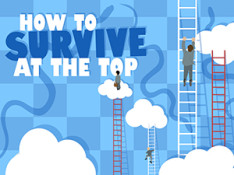How to survive at the top
 Why is it that some leaders come and go from their roles in just a year while others last decades? In a feature that first appeared in Encore, Megan Reynolds looks at what it takes to stay on top.
Why is it that some leaders come and go from their roles in just a year while others last decades? In a feature that first appeared in Encore, Megan Reynolds looks at what it takes to stay on top.
Although they may be the envy of thousands below, for many who soar to the pinnacle of their professions, the time at the top is short-lived. From media agency bosses – agencies such as Mindshare, Ikon, Mediacom, Initiative and ZenithOptimedia have all appointed new CEOs within the last two years – to leaders of media organisations and publications like magazines and newspapers, the top jobs are coveted and highly sought after. But according to the people who have held, and currently hold, these sorts of positions, it’s not always easy staying on top.In a recent piece in Encore, STW’s chief operating officer Chris Savage warned against chasing the CEO title. “So, you think you want to be the CEO, hey? Tread cautiously. Why do you want to be CEO? It’s a tough gig. I know. I have been CEO of several businesses and a CEO consistently for the past 20 years.”
One leader who shows no fear of holding down a top job is long-time media boss Harold Mitchell. Mitchell was ahead of the curve when he launched his independent media buying agency, Mitchell and Partners, in 1976, and well established when competitors started to crowd the market in the years that followed. Similarly he was ahead with the launch of his digital business, emitch, in 2000. And although he’s now taken a step back from his $1bn empire, Mitchell remains in a position of influence and is rumoured to have another startup in the works. “I always had a very long term view. I was in it for a long time so many of the decisions made paid out over the years. A long term vision is necessary to have success at anything, full stop,” says Mitchell.
Mitchell also believes that building trust with staff, clients and the media, as well as earning their respect is critical, as is a good understanding of the business. And for those in leadership positions, Mitchell says imagination and courage are key.


the answer is luck: randomness; falling this way or that ..
that is …. look at your own career, could you have predicted 10 years ago — let alone 5 , where you would be now ? — hardly. No amount of planning and stochastic time predictions is possible and don’t let those “seeing the bell-curve everywhere” academics and statisticians tell you otherwise.
Perhaps you move with the economic flow within a political dynamic and interact with available opportunities at the time; some opportunities get away from you and a few will ltake you by surpise.
A recent book, and this is a recent trend in thinking — was the CEO lucky or skillful ?
Luck plays a big part.